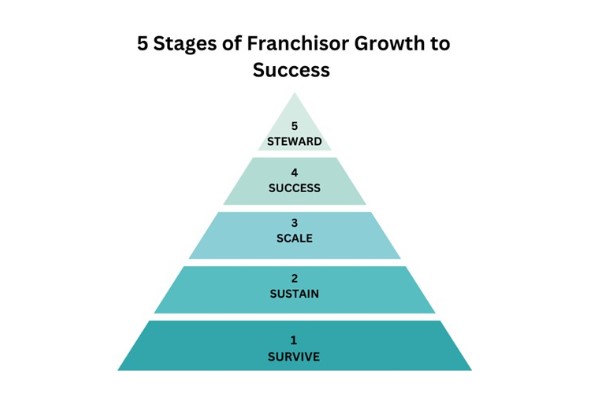By Gerry Henley
In the competitive landscape of franchising, the evolution from startup to industry leader follows a predictable yet challenging trajectory. Understanding these developmental phases can mean the difference between franchising failure and building a thriving, sustainable business empire.
This comprehensive guide explores the five critical stages every successful franchisor must navigate: Survive, Sustain, Scale, Success, and Steward. Each stage presents unique challenges, opportunities, and strategic imperatives that shape the franchisor’s journey toward long-term excellence and market leadership.
Stage 1: Survive – Building the Foundation for Franchise Success
The Challenge: The survival stage is where dreams meet reality. Most franchisors enter this phase undercapitalized, relying heavily on their company-owned units to fund franchise operations while simultaneously trying to build the infrastructure necessary to support future franchisees.
Responsible Franchising requires being well-capitalized, removing dependence on franchise fees for survival and allowing focus on franchisee success rather than short-term cash needs.
Key Characteristics:
- Dependence on company-owned units for cash flow
- Limited working capital for franchise development
- Basic systems and processes in development
- First franchisees joining the system
Strategic Priorities:
- Cash Flow Management: Establish a sustainable blend of franchise fees and royalty income to support operations
- Proof of Concept: Demonstrate that the business model works consistently across different markets and operators
- System Documentation: Create foundational operational manuals, training programs, and support structures
- Quality Control: Ensure early franchisees succeed in building positive momentum and success
Success Metrics:
- Positive cash flow from franchise operations
- Successful launch and operation of initial franchisees
- Documented, replicable business processes
- Basic franchisee support infrastructure in place
Stage 2: Sustain – Achieving Operational Excellence
The Foundation for Growth: Sustainability transforms survival tactics into systematic growth strategies. This stage focuses on achieving royalty self-sufficiency while building robust franchisee support systems that can accommodate expansion.
Key Characteristics:
- Approaching or achieving royalty self-sufficiency
- Established franchisee support systems
- Proven franchisee launch and success methodologies
- Data-driven performance management
Strategic Priorities:
- Royalty Self-Sufficiency: Build a franchisee base large enough that royalties cover operational expenses
- Support System Optimization: Develop scalable training, marketing, and operational support programs
- Performance Benchmarking: Establish system-wide performance metrics and success benchmarks
- Financial Transparency: Implement comprehensive financial reporting to support Item 19 development
- Franchisee Advisory Council (FAC): Create structured franchisee feedback and guidance mechanisms
Success Metrics:
- Royalty income meets or exceeds operational expenses
- Franchisees achieve profitability within their first operational year
- Comprehensive performance benchmarking system in place
- Strong Item 19 financial performance representations
- Active, engaged Franchisee Advisory Council
Critical Systems to Implement:
- Franchisee Business Coaching (FBC) programs
- Regular financial performance reviews
- Standardized operating procedures across all locations
- Marketing and advertising support infrastructure
Stage 3: Scale – Accelerating Growth Through System Optimization
The Multiplication Phase: Scaling represents the transition from managing individual franchisees to orchestrating systematic growth. Success in this stage depends entirely on the franchisor’s ability to replicate franchisee success consistently and efficiently.
Key Characteristics:
- Rapid but controlled expansion
- Systematic franchisee success replication
- Advanced support systems and automation
- Strong brand recognition and market presence
Strategic Priorities:
- Systematic Replication: Perfect the art of launching successful franchisees repeatedly
- Resource Optimization: Leverage technology, systems, and delegation to support growth without overwhelming staff
- Franchise Development Enhancement: Maximize lead generation, conversion, and territory development
- Existing Franchisee Growth: Focus on helping current franchisees expand and optimize their operations
- Market Penetration: Strategic territory development and market expansion
Success Metrics:
- Consistent franchisee success rates across all markets
- Efficient franchise development and onboarding processes
- Happy, profitable franchisees driving referral growth
- Strong brand recognition and market positioning
- Scalable support systems handling increased volume
Operational Excellence Focus:
- Automated training and support delivery systems
- Data-driven decision making across all functions
- Streamlined communication and feedback loops
- Technology-enabled franchisee support platforms
Stage 4: Success – Achieving Stakeholder Fulfillment
The Realization Phase: True success transcends financial metrics, encompassing the fulfillment and prosperity of all stakeholders within the franchise system. This stage represents the culmination of strategic planning, operational excellence, and relationship building.
Key Characteristics:
- All stakeholders experiencing mutual benefit and satisfaction
- Strong financial performance across the system
- Established market leadership position
- Sustainable competitive advantages
Strategic Priorities:
- Stakeholder Value Creation: Ensure franchisees, employees, customers, and the franchisor all benefit from system growth
- Market Leadership: Establish and maintain dominant market position
- Innovation and Evolution: Continuously improve and adapt the business model
- Culture and Values: Strengthen the franchise system’s culture and shared values
- Long-term Sustainability: Build systems and strategies that ensure continued success
Success Metrics:
- High franchisee satisfaction and retention rates
- Strong financial performance across all stakeholders
- Market leadership position in target segments
- Low franchisee turnover and high system satisfaction
- Sustainable competitive advantages and differentiation
Value Creation Focus:
- Franchisee profitability and growth opportunities
- Employee engagement and career development
- Customer satisfaction and loyalty
- Community impact and social responsibility
Stage 5: Steward – Creating Lasting Legacy and Impact
The Legacy Phase: Stewardship represents the highest level of franchisor evolution, where success becomes a platform for creating lasting positive impact. This stage focuses on mentorship, industry leadership, and building a legacy that extends far beyond financial returns.
Key Characteristics:
- Industry thought leadership and influence
- Mentorship and knowledge sharing focus
- Social responsibility and community impact
- Legacy-building initiatives
Strategic Priorities:
- Industry Leadership: Share knowledge and best practices to elevate the entire franchising industry
- Mentorship Programs: Guide emerging franchisors and contribute to industry development
- Social Impact: Use success and resources to create positive community and societal change
- Legacy Building: Establish systems and values that will outlive current leadership
- Knowledge Transfer: Document and share lessons learned for future generations
Legacy Metrics:
- Positive impact on industry standards and practices
- Successful mentorship and knowledge transfer programs
- Community and social responsibility initiatives
- Sustainable business practices and ethical leadership
- Long-term system stability and succession planning
Stewardship Activities:
- Industry speaking and thought leadership
- Franchising education and best practice sharing
- Community investment and social responsibility programs
- Succession planning and leadership development
- Industry association participation and leadership
Navigating Your Franchisor Journey: Key Success Factors
Critical Success Elements Across All Stages:
- Capitalization Strategy: Ensure adequate funding for each stage of growth
- Franchisee Success Focus: Always prioritize franchisee profitability and satisfaction
- System Development: Build scalable systems and processes from the beginning
- Data-Driven Decisions: Use performance metrics to guide strategic choices
- Continuous Learning: Adapt and evolve based on market feedback and results
- Leadership Development: Build strong leadership capabilities within the organization
- Technology Integration: Leverage technology to enhance efficiency and effectiveness
Common Pitfalls to Avoid:
- Stage 1: Over-reliance on franchise fees for survival instead of building sustainable operations
- Stage 2: Failing to achieve royalty self-sufficiency before attempting to scale
- Stage 3: Scaling too quickly without proper systems and support infrastructure
- Stage 4: Focusing solely on financial metrics while neglecting stakeholder satisfaction
- Stage 5: Failing to plan succession and legacy preservation
Conclusion: Your Path to Franchising Excellence
The journey from survival to stewardship represents more than business growth—it embodies the transformation of entrepreneurial vision into lasting impact. Each stage builds upon the previous, creating a foundation for sustainable success that benefits all stakeholders.
Success in franchising isn’t measured solely by financial returns, but by the positive impact created for franchisees, employees, customers, and communities. As you navigate these five stages, remember that each presents unique opportunities to build something greater than yourself—a legacy of excellence that will inspire and support future generations of entrepreneurs.
The path may be challenging, but with proper planning, execution, and commitment to stakeholder success, every franchisor can progress through these stages and achieve both financial success and meaningful impact.
Ready to accelerate your franchisor journey? Every successful franchisor needs guidance, mentorship, and strategic insight to navigate these critical stages effectively.
Schedule your complimentary 60-minute consultation today and discover how to optimize your current stage while preparing for the next level of growth and success.






